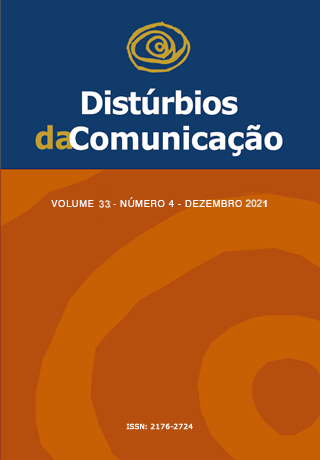Cinema e educação
relato de experiência de extensão durante a pandemia da Covid-19
DOI:
https://doi.org/10.23925/2176-2724.2021v33i4p784-792Palavras-chave:
Fonoaudiologia, Educação a Distância, Coronavírus, Pandemias, Educação SuperiorResumo
Introdução: A pandemia pela COVID-19 impactou diretamente a vida de professores e estudantes, que, devido ao isolamento social, tiveram que reinventar o processo de ensino e aprendizagem. A tecnologia se tornou a principal forma de contato e foi o meio para continuar as aulas e projetos de extensão. Objetivo: Relatar a experiência da idealização e execução de um projeto de extensão baseado em metodologias ativas de ensino-aprendizagem envolvendo a temática do cinema em tempos de isolamento social em um curso de graduação em Fonoaudiologia. Métodos: A comissão organizadora foi composta por 3 professores e 129 participações de graduandos do 5º ao 8º semestre do curso de Fonoaudiologia de uma faculdade privada. Por meio de um planejamento prévio, os integrantes da comissão escolheram o filme, os debatedores, e realizaram o processo de inscrição e divulgação da atividade. O evento foi realizado por meio do serviço de conferência remota “Zoom”. Resultados: Foram promovidos 12 encontros com duração de 2 horas cada encontro, com um total de 1717 inscritos, 896 ouvintes. Para as discussões foram convidados ao todo 36 debatedores, sendo eles fonoaudiólogos, psicólogos, fisioterapeutas, técnicos em enfermagem, advogados, empresários, policiais militares, administradores de empresas, médicos e pedagogos. Os debatedores abordaram temas pessoais e profissionais proporcionando aos ouvintes um olhar mais profundo e diferente em relação ao filme e aos contextos vividos diariamente. Conclusão: A execução do projeto de extensão CineUNIPLAN, por modalidade remota, proporcionou o engajamento dos alunos do curso de graduação em fonoaudiologia em tempos de isolamento social, levantando discussões relevantes, em um momento descontraído.
Downloads
Referências
Wang C. A novel coronavirus outbreak of global health concern. Lancet. 2020; 395: 470–473. doi: 10.1016/S0140-6736(20)30185-9.
Mahase E. China coronavirus: WHO declares international emergency as death toll exceeds 200. BMJ Clin. Res. Ed. 2020; 368: m408. doi: 10.1136/bmj.m408.
Ferrel MN, Ryan JJ. The impact of COVID-19 on medical education. Cureus. 2020 Mar 31; 12(3): e7492. doi: 10.7759/cureus.7492.
BRASIL. Portaria nº188, de 3 de fevereiro de 2020. Declara Emergência em Saúde Pública de importância Nacional (ESPIN) em decorrência da Infecção Humana pelo novo Coronavírus (2019-nCoV). 2020a.
BRASIL. Portaria nº 343, de 17 de março de 2020. Dispõe sobre a substituição das aulas presenciais por aulas em meios digitais enquanto durar a situação de pandemia do Novo Coronavírus - COVID-19. 2020b.
Bezerra IMP. State of the art of nursing education and the challenges to use remote technologies in the time of Corona vírus pandemic. J Hum Growth Dev. 2020; 30(1):141-47. Avalaible from: < http://pepsic.bvsalud.org/pdf/rbcdh/v30n1/pt_18.pdf >.
Cavalcante ASP, Machado LDS, Farias QLT, Pereira WMG, Silva MRF. Educação superior em saúde: a educação à distância em meio à crise do novo Coronavírus no Brasil. Av Enferm. 2020; 38(1supl).
Wang C, Pan R, Wan X, Tan Y, Xu L, Ho CS, Ho RC. Immediate psychological responses and associated factors during the initial stage of the 2019 Coronavirus Disease (COVID-19) epidemic among the general population in China. Int J Environ Res Public Health. 2020 Mar 6; 17(5): 1729. doi: 10.3390/ijerph17051729.
Ornell F, Schuch JB, Sordi AO, Kessler FHP. Pandemic fear and COVID-19: mental health burden and strategies. Braz J of Psychiatry. 2020; 42(3): 232-35.
Li HY, Cao H, Leunh DY, et al. The psychological impacts of a COVID-19 outbreak on college students in China: A longitudinal Study. Int. J. Environ. Res. Public Health. 2020; 17, 3933. Available from: <https://pesquisa.bvsalud.org/portal/resource/pt/mdl-32498267>.
Rodrigues KG, Lemos GA. Metodologias ativas na educação digital: possibilidades didáticas inovadoras na modalidade EAD. Ensaios Pedagógicos (Sorocaba). 2019; 3(3): 29-36.
Coon RA. Cinema in nursing education: tapping into the affective domain. J Nurs Educ. 2018 Mar 1; 57(3): 188-189.
Silva CEEBC. A crítica de cinema como estratégia didática. Palavras - revista em linha. 2020; 3(3).
Silva MS, Vasconcellos SD. Extensão universitária e formação profissional: avaliação da experiência das ciências biológicas na Universidade Federal de Pernambuco. Estudos em Avaliação Educacional. 2006; 17(33): 119-36.
Zhong BL, Luo W, Li HM, Zhang QQ, Liu XG, Li WT, Li Y. Knowledge, attitudes, and practices towards COVID-19 among Chinese residents during the rapid rise period of the COVID-19 outbreak: a quick online cross-sectional survey. Int J Biol Sci. 2020 Mar 15; 16(10): 1745-1752.
Arroyo DMP, Rocha MPML. Meta-avaliação de uma extensão universitária: estudo de caso. Avaliação. 2010; 15(2): 135-161.
Resende JC, Alves RBS, Coutinho MS, Bragagnoli G, Araújo CRF. Importância da iniciação científica e projetos de extensão para graduação em medicina. R Bras Ci Saúde. 2013; 17(1): 11-18.
Almarzooq ZI, Lopes M, Kochar A. Virtual learning during the COVID-19 pandemic: a disruptive technology in graduate medical education. J Am Coll Cardiol. 2020 May 26; 75(20): 2635-2638.
Sciortino F. Why organizing a scientific conference can produce huge benefits. Nature. 2018 Jul; 559(7714): 431. doi: 10.1038/d41586-018-05714-9.
Souza CJ et al. Maturidade acadêmica: uma questão de mudança de paradigma. Research, Society and Development. 2020; 9(6): 1-14.
Oliveira CT, Santos AS, Dias ACG. Percepção de estudantes universitários sobre a realização de atividades extracurriculares na graduação. Psicologia: Ciência e Profissão. 2016; 36(4): 864-76.
Downloads
Publicado
Edição
Seção
Licença
Copyright (c) 2021 Camila de Castro Corrêa, Vanessa Luisa Destro Fidêncio, Joyce Ribeiro Martins, Ingrid Moura de Jesus Pereira, Kalita Kayne Rodrigues, Rebeca Moreira Louzas, Giédre Berretin-Felix, Lygia Rondon de Mattos Noblat

Este trabalho está licenciado sob uma licença Creative Commons Attribution 4.0 International License.









